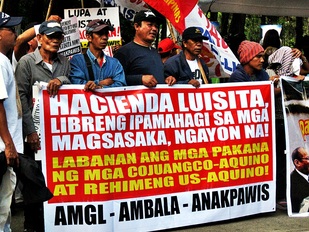
Banc session in Baguio City. (Photo by AMGL)
“We demand that DAR issue a collective certificate of land ownership award or CLOA and not individual CLOAs as the latter would definitely lead to re-concentration of lands to the control of the Cojuangco-Aquinos,” Felix Nacpil said, Ambala chairperson.
“DAR should recognize the Ambala as the legitimate farmworkers’ organization in Hacienda Luisita as other groups are publicly known to be connected with Hacienda Luisita, Inc. or the Cojuangco-Aquino family. Ambala, together with the United Luisita Workers’ Union (Ulwu) is the only organization who fought until the Supreme Court decided in favor of land distribution,” Joseph Canlas said, Amgl chairperson.
Amgl said that Ambala and Ulwu remained to demand land distribution while other groups even sided with the Cojuangco-Aquinos in preserving the junked stock distribution plan (SDP) during the oral arguments at the Supreme Court in 2010. Other groups who are demanding the implementation of the Comprehensive Agrarian Reform Program (CARP) or CARP Extension with “Reforms” (CARPer) have only surfaced when the issue was already at the SC.
“The group led by Noel Mallari should be ignored by DAR as he is totally a paid lackey of the Cojuangco-Aquino family. He was even with Atty. Antonio Ligon at the SC defending the SDP. Everybody in the hacienda knows he is under the Cojuangco-Aquinos. They are demanding individual distribution as a precursor to returning lands to the Cojuangco-Aquinos. His very presence is a threat to the realization of land reform in the hacienda,” Nacpil said.
“We affirm our call that CARPer is not feasible to be implemented in the hacienda as it is worse than CARP. CARPer requires attestation from the Cojuangco-Aquinos that a farmworker-beneficiary is indeed eligible. The program also provisioned that lands should be returned to the Cojuangco-Aquinos or Land Bank in case FWBs could not pay the set amortization,” Canlas said.
On April 24, 2012, the Supreme Court decided that the 1989 land valuation should be used in compensating the Cojuangco-Aquinos and affirmed the 14-0 November 22, 2011 landmark decision that Hacienda Luisita or the remaining 4,915-hectare agricultural lands should be distributed to 6,296 farmworker-beneficiaries. The decision also ordered that the Cojuangco-Aquinos should pay the farmworkers the sum of P1.3 billion as backshares from the income generated by the conversion of lands that were part of the hacienda. The 1989 land valuation pegged a hectare at P40,000, or about P196.6 million to be paid to the Cojuangco-Aquinos.
“DAR should not complicate the process as Ambala has the list of 6,296 legitimate farmworker-beneficiaries. They even have the list of the family members of dead FWBs who supposed to inherit the benefit of their parents,” Canlas said.
Amgl and Ambala also called for free land distribution as the farmworkers morally and historically own Hacienda Luisita.
“Farmworkers should not be charged of compensating the Cojuangco-Aquinos as it is not theirs since 1967, they have generated unimaginable income from exploiting farmworkers and DAR should remember that SC ordered them that P1.3 billion should be returned to the farmworkers. If it is to be computed, the Cojuangco-Aquinos still owe the farmworkers more than P1 billion,” Canlas said.
Aside from collective ownership, Ambala is pushing for collective farming as the lands if individually distributed would only cover about 0.78-hectare, a landsize that would not suffice the livelihood of a farmworker-family. Thus, they are advocating the implementation of collective farms to upgrade productivity and reduce production costs.
“If lands would be distributed individually, farmworkers would be forced to sell their lands as 0.78-hectare is obviously small to support their daily needs. Thus, in essence of realizing land reform, collective ownership should be the correct course of action DAR should carry on,” Canlas said. #
 RSS Feed
RSS Feed
